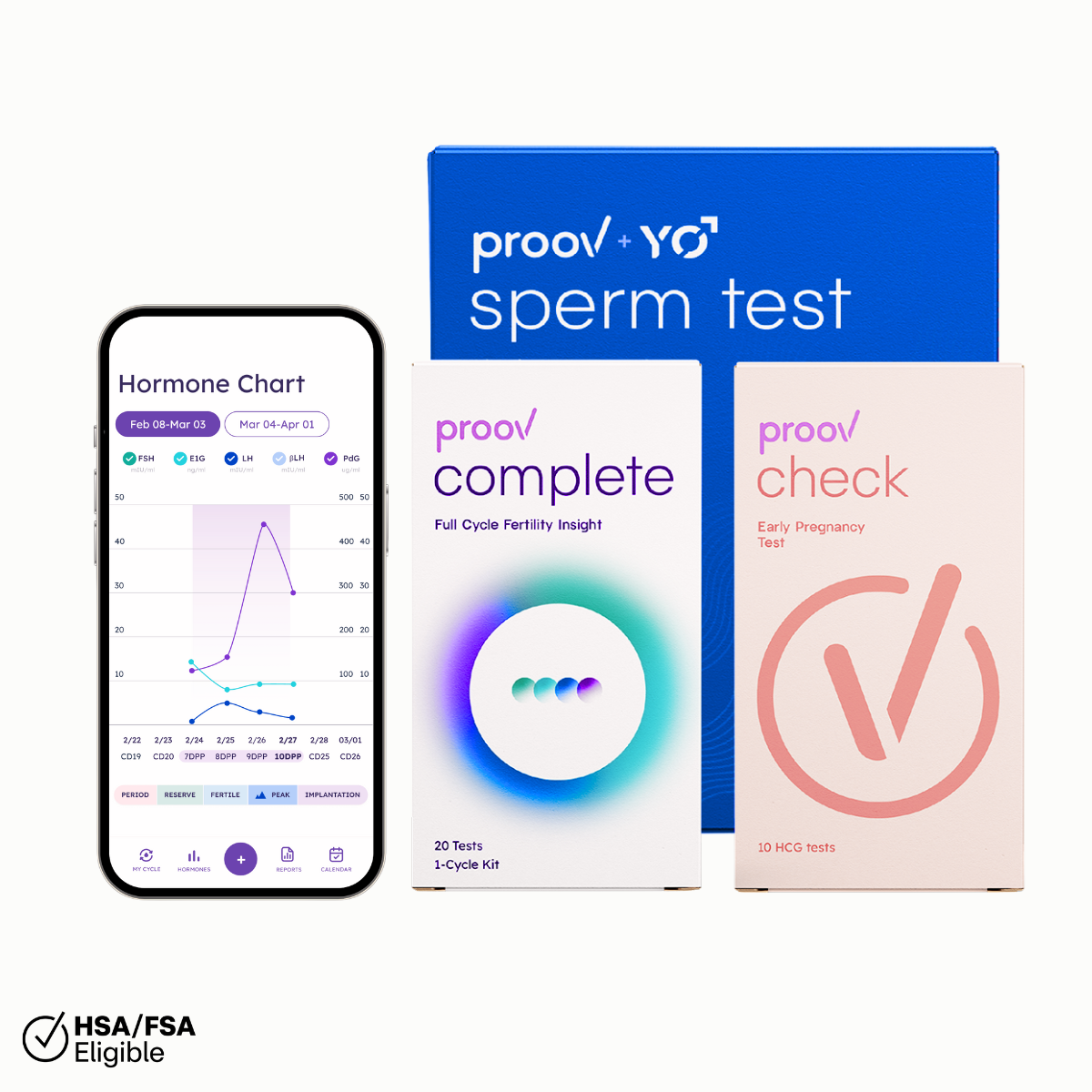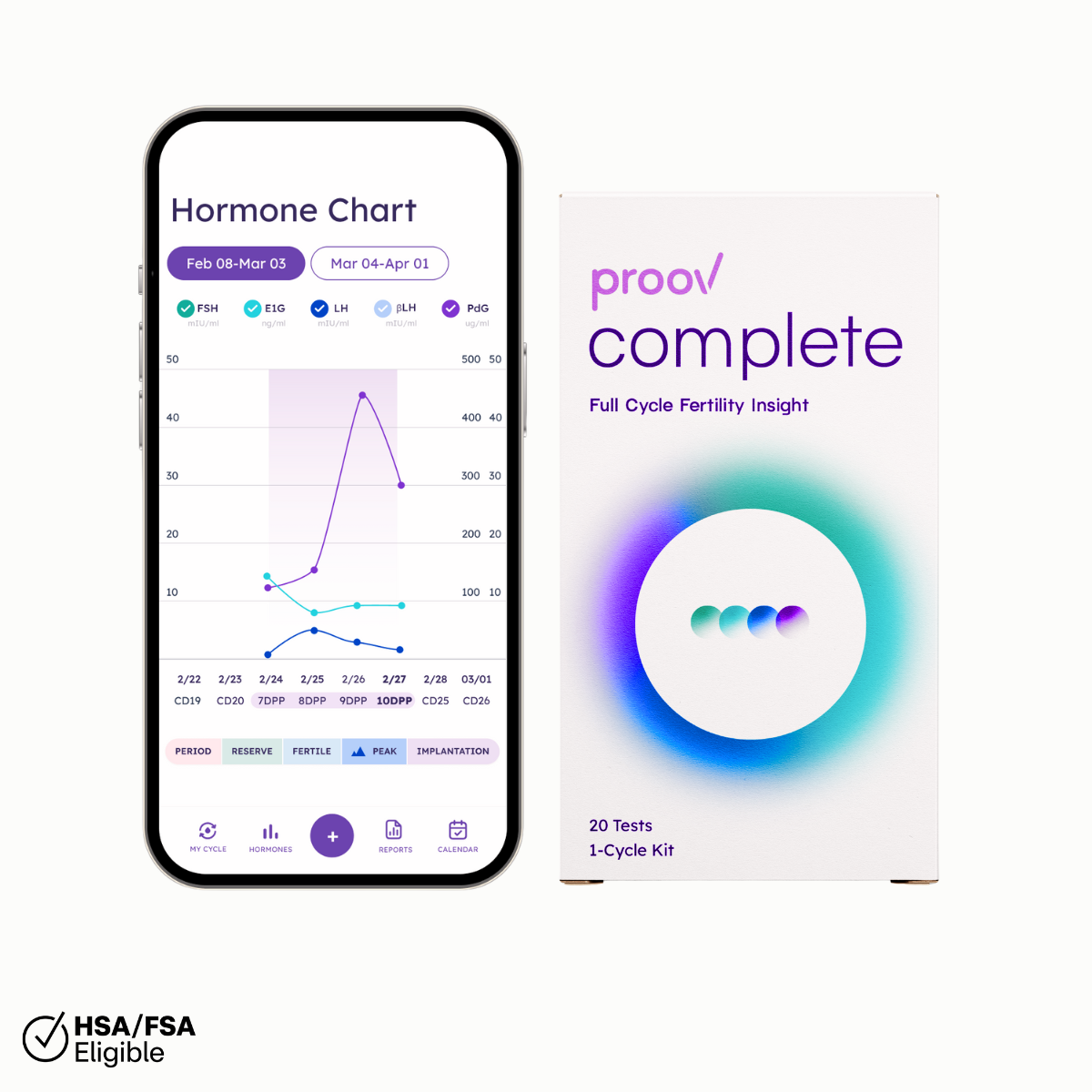Written by: Dr. Amy Beckley, PhD, Founder and Inventor of the Proov test — the first and only FDA-cleared test to confirm successful ovulation at home.
Written on 3/24/21

Did you know that an iron deficiency may impact your fertility?
Iron deficiency — having an insufficient amount of iron in your bloodstream — is a common condition that affects many people around the world. But did you know that an iron deficiency and infertility may be connected?
Nutrients and overall health are important when trying to conceive. Keep reading to learn how iron impacts fertility!
Why is iron important?
Iron is an essential mineral that plays a part in our everyday lives. It’s essential for growth, developments, and metabolic functions, such as making hormones and neurotransmitters.
Iron’s more commonly known role is in creating hemoglobin, which carries oxygen through your bloodstream via red blood cells. Hemoglobin is responsible for bringing oxygen to every part of your body. Without enough iron, getting oxygen to other parts of your body is much harder!
What is an iron deficiency?
Iron deficiency occurs when there is not enough iron directly in your bloodstream. An iron deficiency can sometimes be asymptomatic because if you don’t have enough iron, your body will first take iron that’s stored in other places, like muscles, bone marrow, the spleen or liver.
However, after those iron stores are depleted, the most common symptom is fatigue. This is due to a lack of oxygen in your body. Iron deficiency anemia occurs when you are lacking oxygen to the point that your red blood cells start to shrink.
Other symptoms include trouble concentrating, a swollen tongue, brittle hair and nails, pale skin, and a decreased appetite. Your immune system also may be repressed, meaning you may get sick easier.

Iron deficiency anemia occurs when you are lacking oxygen to the point that your red blood cells begin to shrink.
How does iron deficiency affect women?
Iron deficiency is more common in women than in men. According to the World Health Organization, approximately one-third of all women of childbearing age are anemic. Some reasons for this include:
- Not eating enough foods the contain iron
- Not eating foods that improve the absorption of iron
- Blood loss during your period (especially common in women with heavier flow)
- Conditions that may inhibit the absorption of iron, such as inflammatory bowel disease
Women ages 19-59 should get about 18 mg of iron each day, which is about 10 more mg than is recommended for men. Note that pregnant women should intake 27 mg daily and about three-quarters of that iron should come from heme iron.
So how does iron deficiency impact fertility?
Micro nutrient deficiencies have been associated with infertility. So, can anemia cause infertility? Iron deficiency anemia, specifically, may increase the risk of infertility.
While research is still developing, some studies have shown that iron deficiency amenorrhea (the absence of your period) can be caused by iron deficiency anemia. This is due to the fact that your body doesn’t want to lose any more iron, so it stops you from menstruating. In fact, researchers estimate that amenorrhea occurs in about 50% of women of child-bearing age with iron deficiency anemia.
Iron deficiency has also been associated with anovulation (the lack of ovulation) and ovulatory disorder fertility. A 2006 study followed 18,555 pre-menopausal women with no history of infertility for 8 years to assess dietary intake and changes in fertility. This study found that women who took iron-containing supplements and ate iron-rich foods were at a significantly lower risk of ovulatory disorder infertility compared to those who didn't.
Anovulation and ovulatory disorder infertility are both important because without an egg, pregnancy just isn’t possible! Additionally, “weak” ovulation can make it more difficult to conceive.

Anovulation and ovulatory disorder infertility are both important because without an egg, pregnancy just isn’t possible!
What do we mean by “weak” ovulation?
Great question! Contrary to popular belief, there is actually more than one way to ovulate — and not all ovulation is created equal.
This is because after an egg is released, the empty follicle (also called the corpus luteum) starts producing progesterone. Progesterone is the hormone that stabilizes the uterine lining and makes it “sticky” enough for an embryo to implant. Without enough progesterone for long enough — meaning it needs to remain elevated for several days — it can be more difficult to successfully conceive.
Ovulation is considered “successful” when an egg is released and progesterone levels remain adequately elevated for a long enough period of time. If progesterone isn’t high enough or drops too soon, then ovulation is considered weak.
How can I tell if iron deficiency is causing ovulatory disorders?
If you suspect you may have an iron deficiency, we first recommend consulting your doctor. He or she will be able to perform tests to assess your iron levels.
Regardless of if you have iron deficiency, understanding your ovulation health can help you get pregnant faster.
Proov PdG tests are the first and only FDA cleared PdG test kit to confirm successful ovulation at home. PdG is a urine metabolite of progesterone.
After progesterone circulates through your bloodstream, it is metabolized by your liver and expelled from your body in urine. Studies show that PdG levels in first morning urine show an average of all serum progesterone levels from the day before.
Testing with Proov PdG tests on days 7, 8, 9, and 10 after peak fertility can give insight into your ovulation health. While a single positive Proov test confirms that an egg was released, we like to see 3-4 positives on days 7-10 past peak to confirm that successful ovulation did in fact occur.
How can I increase my iron intake?
Whether you are concerned about ovulatory disorder infertility due to iron deficiency or are just beginning TTC, upping your iron intake is likely a good idea. Here are some great sources of iron:
- Red meat
- Chicken
- Salmon
- Tuna
- Eggs
- Beans
- Tofu
- Broccoli
- Dried fruit
- Peanut butter
- Enriched grains
If you have a heavy period or are currently pregnant and are in need of a high-quality iron supplement, we recommend Proferrin. Proferrin contains Heme Iron Polypeptide, a natural form of iron with high absorption and low side effects that helps and maintains healthy iron levels. (We always recommend consulting your doctor before starting any supplementation.)
Before trying to conceive, it’s so important to ensure your body is getting all the right micro nutrients — especially iron!














